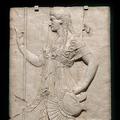032 Pronomina - quilibet et alia
|anyone||
032 Pronomen – jeder und andere
032 Pronouns - everyone and others
032 Pronombres - todos y otros
032 Pronoms - tout le monde et les autres
032 Voornaamwoorden - iedereen en anderen
032 Pronomes - todos e outros
032 Местоимения - все и другие
032 Займенники - всі та інші
Tranquillo mari quivis facile navem gubernat.
calmly||anyone|||
||誰でも|||操縦する
Mar en calma|||||
Anybody can driving the boat easily with calm sea.
Cualquiera gobierna fácilmente el barco con el mar tranquilo
静かな海で誰でも簡単に船を操ることができる。
mari- with sea; tranquillo- calm: quivis- anybody; navem- boat; gubernat- driving
В спокойном море любой человек сможет легко управлять кораблем.
Regnavit Ancus Marcius annos quattuor et viginti, cuilibet superiorum regum belli pacisque et artibus et gloria par.
reigned||||||twenty|to any|of the kings|of the kings||peace||arts|||
|||||||どの王にも|||||||||
Ancus Marcius reigned twenty-four years, equal to any of the previous kings in war and peace, and in arts and glory.
アンクス・マルキウスは24年間統治し、そのすべての王の中で戦争、平和、技術、栄光において匹敵する者であった。
Анк Марций правил двадцать четыре года, равный любому из предыдущих царей в войне и мире, искусстве и славе.
Deo salus unius cuiusque hominum curae est.
|salvation|of one|||care|
|||各人の|||
God cares about the salvation of each person.
神は一人一人の人間の健康を気にかけている。
Бог заботится о спасении каждого человека.
Suae quisque fortunae faber est.
||own fortune||
|||自分の運命|
The architect of his own fortune.
それぞれの人は自分の運の職人である。
Архитектор своего счастья.
Sibi quisque proximus est.
||nearest|
|各自||
Everyone is close to him.
それぞれの人は自分自身に最も近い存在である。
Все ему близки.
Ariovistus, ut semel Gallorum copias proelio superavit, superbe et crudeliter imperavit et obsides nobilissimi cuiusque liberos postulavit.
||once|of the Gauls||||proudly||cruelly|commanded||hostages||||demanded
||一度|ガリア人の|||||||||||||
||||||||||mandó con crueldad||||||
Ariovistus, having once defeated the forces of the Gauls in battle, commanded proudly and cruelly, and demanded hostages of the most noble children of each.
アリオビストスは、一度ガロスの軍勢に戦で勝利を収めると、傲慢かつ残酷に支配し、最も名門の人々の子供を人質に要求した。
Ариовист, разгромив однажды в бою силы галлов, командовал гордо и жестоко и потребовал в заложники самых знатных детей каждого.
Quem quisque amat, honorat.
|||honors
|||尊敬する
Whom every man loveth, he honoureth.
誰もが愛する者を尊敬する。
Кого каждый человек любит, того почитает.
Olympia quinto quoque anno celebrabantur.
Olympia||||were celebrated
オリンピア|第五|毎年||
The Olympics were held every fifth year.
オリンピアは毎年開催されていた。
Олимпийские игры проводились раз в пять лет.
In foro consules mihi obvii fuerunt; ambos salutavi; uterque resalutavit.
||the consuls||met||both of them|I greeted|each|he responded
|||||||||再挨拶
The consuls met me in the market; I greeted them both; both of them saluted.
フォーラムで執政官たちに出会った; 両方とも挨拶した; 互いに再び挨拶しました。
De Sullae et Marii saevitia in cives tibi narravi; utrius saevitia maior fuit?
||||cruelty||||I told|whose|||
||||残虐性||||||||
I told you about the cruelty of Sulla and Marius to the citizens; which was the greater cruelty?
スッラとマリウスの市民に対する残虐さについて話しましたが、どちらの残虐さがより大きかったですか?
Я рассказал тебе о жестокости Суллы и Мариуса к горожанам; Что было большей жестокостью?
Uterque crudelissimus fuit: neutrius facta probo.
|most cruel||neither||I approve
|||neither||
Both were most cruel: I can prove that neither was done.
どちらも非常に残虐でした:どちらの行動も私は評価しません。
Оба были крайне жестокими: я могу доказать, что ни того, ни другого не было сделано.
Pater Ovidii cum utroque filio ex patria in urbem Romam demigravit.
|||both|son||||||moved
|オウィディウ|||||||||
Ovid's father, with both his sons, left the country for the city of Rome.
オウィディウスの父は、2人の息子と共に故郷からローマの街へ移住しました。
Отец Овидия вместе с обоими сыновьями покинул страну и перебрался в Рим.
Iudices non timeo, quod nullius iniuriae mihi conscius sum.
judges||I fear|||of injustice|||
judges||||||||
|||||||consciente de|
I do not fear the judges, because I am aware of no wrongdoing.
私は裁判官を恐れません。私は誰の不正も知りません。
Nemo Thebanus Epaminondam laude bellica superavit.
|Theban|Epaminondas|military praise|military|surpassed
||エパミノンダ|称賛|戦争の|超えた
No Theban surpassed Epaminondas in military glory.
テーベ人はエパミノンダスを戦の誉れで超えた者はいない。
Ни один фиванец не превзошел Эпаминонда в военной славе.
Nihil miserius est quam homo, qui a nullo amatur.
|more miserable||||||no one|is loved
|more miserable|||||||愛されていない
||||||||es amado por
There is nothing more miserable than a man who is loved by no one.
誰からも愛されない人間ほど不幸な者はいません。
Нет ничего более несчастного, чем человек, которого никто не любит.
In neminem avari boni sunt, in se pessimi.
|no one|the greedy|good||||the worst
|誰も||||||最悪の
They are good to be avaricious to no one, but worst to themselves.
貪欲な者の中に良い者はおらず、自分自身の中に最悪の者がいる。
Хорошо, когда они ни к кому не скупы, но хуже всего — к самим себе.
Nimium boni est, cui nihil est mali.
too much||||||
He is too good to whom there is nothing bad.
全く悪いものが何もない人には、あまりにも良い。
Слишком хорош тот, для кого нет ничего плохого.
Nulla re animus aeger magis recreatur quam artibus bonis.Nonnulli alliena magis curant quam sua.
||mind|sick||is refreshed||the arts||some|foreign||||
何も|||病んでいる|||||||||||
There is nothing that refreshes a sick mind more than good arts. Some people care more for others than for their own.
病んだ心は、良い技芸によってより一層癒される。 他人のことを自分のことよりももっと気にかける者もいる。
Ничто так не освежает больной ум, как хорошие искусства. Некоторые люди больше заботятся о других, чем о своих собственных.

